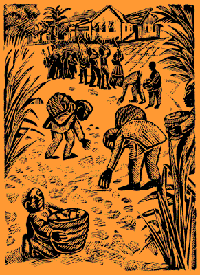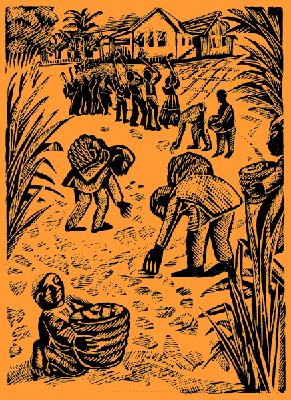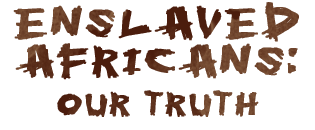
Kwame - Life in Americas
I should reintroduce myself. I am now Peter, or so Mr. Wells says. He is the owner of this plantation near a place called Bridgetown. I didn't think it possible to hate a thing, but I hate this place and I hate sugar - its smell, its touch, the rats, the snakes. By day I work in the field with 200 other miserable souls, burning and cutting. We watch the ground and work quickly, trying not to look at the traitor with the dogs and the whip.
Kwame works in the fields

Kwame works in the fields. They are clearing the ground before planting sugar cane.
Peter
Africans were often given new, European names. It was thought that this would help remove any sense of identity and remaining ties with Africa, and may make the slaves more docile.
Plantation
Plantations are large estates where cotton, sugar, tobacco etc. are grown. Most Africans were brought to the Americas to work on these farms, with about 200 slaves on each plantation. Kofi is on a tobacco plantation (probably Maryland or Virginia), which were relatively small. The slaves there worked closely with the white owner or the overseer.
Bridgetown
Bridgetown is the capital of Barbados. Britain's first interest in the island was as a defence for English colonies and as a base from which to attack Spanish ships. The arrival of sugar changed that. The sugar trade and slave labour made Barbados the richest island on Earth.
Sugar
The sugar trade on Barbados began in around 1640. By 1667 there were 745 plantations owners and 80,000 slaves cultivating sugar. The rapid growth of the trade, and a shortage of local labour, resulted in traders turning to slavery.
Work
Many Africans had been skilled workers in their own societies but were made to do unskilled work in the Americas. However, they were not just field workers or cooks. Africans did many jobs in the Americas including metalworking, barrel making, woodworking and gun making. Slaves were also sailors, sometimes on slave ships.
Burning
The sugar is burnt before the harvest to destroy all the unwanted leaves and weeds. It also kills or chases away any rats, snakes, spiders etc.
Traitor
This overseer is a black man who had been a slave. In the last years of slavery black people were promoted to positions of responsibility and power. It was hoped that this would reduce the sense of enslavement and the chance of rebellion. In many cases the black overseer was as brutal as the white overseer.


